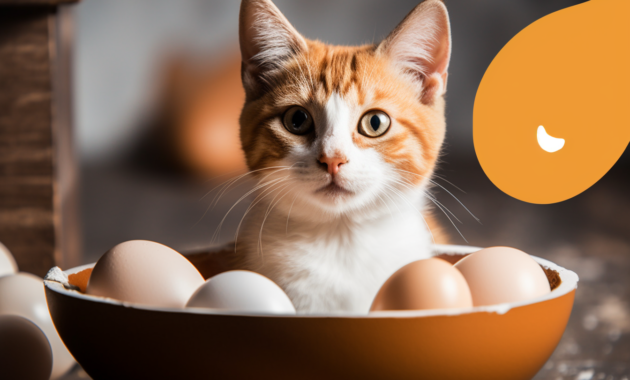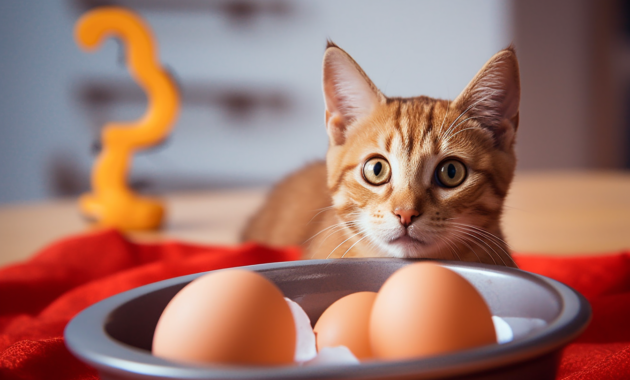
Cats are infamous for their picky eating habits, making it challenging for pet owners to know what to feed them.
One of cat owners’ most common questions is whether or not they can give their feline friends eggs.
As it turns out, the answer isn’t as straightforward as you might think.
While some cats love scrambled eggs, others struggle to digest them properly.
To help you navigate this tricky topic, we’ve consulted with experts to determine whether cats can eat eggs and what precautions you should take if you decide to feed them this protein-packed food.
Whether you’re a seasoned cat owner or considering adopting a furry friend, read on to learn everything you need about giving your cat eggs.
Nutritional Benefits Of Eggs For Cats

Do you ever wonder if your feline friend can eat eggs? The answer is a resounding YES!
Not only are eggs a tasty treat for cats, but they also offer numerous nutritional benefits.
Eggs are rich in protein, vitamins, and minerals that help support your cat’s overall health.
While egg yolks and whites provide nutritional benefits, the yolk is where most nutrients are found.
It contains healthy fats, vitamins A and D, and choline, which helps support brain function.
When it comes to cooking methods for eggs, it’s best to avoid frying them in oil or butter, as this can add unnecessary fat to your cat’s diet.
Instead, boil or poach the eggs without adding salt or seasoning. This ensures that your cat gets all the nutrients without any harmful additives.
However, feeding your cat too many egg yolks can lead to a high-fat diet, so practising moderation’s important.
Always consult your veterinarian before introducing new foods into your pet’s diet.
With proper preparation and moderation, eggs can be an excellent addition to your cat’s nutrition plan.
Your furry friend will thank you for the delicious and nutritious snack!
SEE ALSO
5 Creative Cat Furniture Pieces For Any Space
5 Calmest Cat Breeds That Are Anything But Wild
Risks And Precautions Of Feeding Cats Eggs

Feeding your cat eggs can be a great way to add variety to their diet, but taking some precautions is essential.
While eggs are generally safe for cats to eat, there are some risks involved that you should be aware of.
One of the main concerns is the potential for bacterial contamination, which can cause illness in cats.
To minimize these risks, only feeding your cat-cooked eggs is essential and avoiding giving them raw or undercooked eggs.
This will help eliminate any harmful bacteria that may be present in the egg.
Additionally, you should limit the frequency you feed your cat eggs. While they can provide some nutritional benefits, too much of a good thing can lead to health problems.
When preparing eggs for your cat, it’s also essential to avoid adding any seasoning or ingredients that could be harmful to them.
Avoid using salt or other spices that could upset their digestive system.
Instead, opt for plain scrambled or boiled eggs as a treat every once in a while.
By following these guidelines and being mindful of how often you feed your cat eggs, you can safely incorporate this protein-rich food into their diet without any issues.
Signs Of Egg Intolerance In Cats

You may notice a few symptoms if your cat is intolerant to eggs. These can include vomiting, diarrhea, and lethargy.
While these symptoms can be concerning, they are not necessarily life-threatening.
However, you should consult a veterinarian if your cat develops severe symptoms or has an underlying health condition.
Remedies for egg intolerance in cats vary depending on the severity of the symptoms.
Mild cases may only require a change in diet or avoiding eggs altogether.
More severe cases may require medication or other treatment options. Your veterinarian can help determine the best course of action for your cat.
It’s important to note that cat egg allergies are rare but can occur.
If your cat shows signs of an allergic reaction, such as difficulty breathing or swelling, seek immediate veterinary care.
Treatment options for egg allergies may include medication and avoiding eggs in the diet.
As always, consult your veterinarian for proper diagnosis and treatment options for your cat’s food intolerance or allergy.
How To Safely Incorporate Eggs Into Your Cat’s Diet
Now that we know the signs of egg intolerance in cats let’s explore how to safely incorporate eggs into their diet.
It is important to note that while cats can eat eggs, they should not be given as a primary source of nutrition. Eggs are best used as an extra treat for your feline friend.
When preparing eggs for your cat, it is recommended to cook them thoroughly to avoid any risks of salmonella or other bacterial infections.
Scrambled or boiled eggs are great options for cats, but avoid adding seasonings or other ingredients that could harm your cat’s digestive system.
As for feeding frequency, it is best to offer small amounts of the egg as an occasional treat rather than making it a regular part of their diet.
Too much egg can lead to an imbalanced diet and potential health issues.
Always consult your veterinarian before significantly changing your cat’s diet.
Remember, incorporating eggs into your cat’s diet should be done with caution and moderation.
With proper preparation and feeding frequency, you can offer your feline friend a tasty and nutritious treat without compromising their health.
Other Healthy Foods For Your Feline Friend
While eggs can be a healthy addition to your cat’s diet, there are other options you can explore when it comes to feeding your feline friend.
Healthy treats and homemade meals can be a great way to ensure your pet receives all the necessary nutrients to thrive.
One option is alternative proteins such as chicken, turkey, or fish. These meats are protein-rich and can be easily incorporated into your cat’s diet.
It’s important to note that beef should be cooked thoroughly and deboned before serving.
Another option is vegetables.
While cats are obligate carnivores, incorporating small amounts of vegetables into their meals can provide additional fibre and vitamins.
Some safe options include cooked carrots, green beans, and spinach.
| Food | Benefits | Serving Suggestions |
|---|---|---|
| Cooked Chicken | High in protein | Shredded over kibble or mixed with cooked vegetables |
| Cooked Salmon | Rich in omega-3 fatty acids | Flaked over kibble or served as a standalone meal |
| Cooked Sweet Potato | Rich in fibre and helps with digestive issues | Mashed and mixed with canned food or served as a standalone meal |
| Pumpkin | Rich in fiber and helps with digestive issues | Mixed into wet food or served as a small treat |
| Blueberries | Antioxidants help fight free radicals in the body | Served as a treat or mixed into wet food |
Incorporating these alternative proteins and vegetables into your cat’s diet can give them essential nutrients while adding variety to their meals.
Always consult with your veterinarian before making significant changes to your cat’s diet.
With some experimentation, you may find that your feline friend has some new favourite foods!
Frequently Asked Questions
Can Raw Eggs Be Given To Cats?
Raw eggs can benefit cats as they are an excellent source of high-quality protein, essential amino acids, and vitamins such as B12 and D.
However, there are also risks associated with feeding raw eggs to cats.
Raw eggs may contain bacteria such as Salmonella or E. coli, which can cause cat illness.
Additionally, feeding too many raw egg whites may lead to a deficiency in biotin, a vitamin necessary for healthy skin and coat.
It’s essential to weigh the benefits and risks before deciding whether or not to incorporate raw eggs into your cat’s diet.
If you feed your cat raw eggs, ensure they come from a reputable source and are adequately prepared to minimize the risk of bacterial contamination.
Is It Safe To Feed Cats Eggshells?
Feeding your feline friend eggshells might seem like a good idea at first, but beware of the potential risks involved.
While it’s true that eggshells can provide some benefits to cats, such as being a great source of calcium and other minerals, they can also pose a choking hazard if not appropriately prepared.
Moreover, they may contain harmful bacteria that could lead to food poisoning or other health issues.
So, before you go ahead and add eggshells to your cat’s diet, make sure you consult with your vet first to ensure their safety.
Can Cats Eat Egg Yolks And Whites Separately?
Yes, cats can eat egg yolks and whites separately.
However, ensuring that the eggs are cooked and not raw is crucial.
Raw egg whites contain avidin, which can interfere with your cat’s biotin absorption, potentially leading to skin and coat problems.
Similarly, raw yolks may contain salmonella bacteria that could cause food poisoning in your feline friend.
Additionally, while eggs can be a nutritious addition to your cat’s diet by providing protein and essential vitamins like vitamins A and B12, some cats may have egg allergies or sensitivities that could result in gastrointestinal distress or skin irritation.
Therefore, always introduce eggs gradually into your cat’s diet and monitor their response carefully before making them a regular part of their meals.
Should Eggs Be Cooked Before Feeding To Cats?
Eggs are a staple in many households, and it’s common to wonder whether our feline companions can partake in the goodness too.
While there are benefits to feeding cats raw eggs (such as providing a source of protein), there are also risks involved. Raw eggs may contain salmonella or E. coli, which can harm cats.
Cooking eggs before feeding them to cats is recommended by experts, as it eliminates the risk of contamination and increases digestibility.
It’s important to remember that cats have different dietary requirements than humans, and consulting with a veterinarian before changing their diet is always a good idea.
As the saying goes, ‘An ounce of prevention is worth a pound of cure.’
How Often Can Eggs Be Included In A Cat’s Diet?
Eggs can be a great source of protein and other nutrients for cats, but it’s essential to consider the frequency with which they are included in their diet.
While eggs can offer numerous benefits, including improved skin and coat health, too much of a good thing can lead to imbalances in a cat’s overall nutritional intake.
As such, it’s recommended that eggs be fed to cats only occasionally as part of a well-balanced diet.
Paying attention to the frequency with which you feed your cat eggs and ensuring that they receive all the other nutrients they need regularly can help keep them healthy and happy for years to come.
Conclusion
In conclusion, while cats can eat eggs, taking some precautions is essential.
Raw eggs should be avoided due to the risk of salmonella poisoning.
While eggshells are a great source of calcium, they should be crushed and added to food in small amounts.
Both egg yolks and whites can be fed separately or together after being cooked thoroughly.
Cooked eggs are a safe option for cats, providing them with essential nutrients like protein and amino acids.
However, it’s important not to overdo it and include eggs in their diet only occasionally.
So, if you want to treat your feline friend with scrambled eggs or an omelette, go ahead and do so, but always keep moderation in mind!




